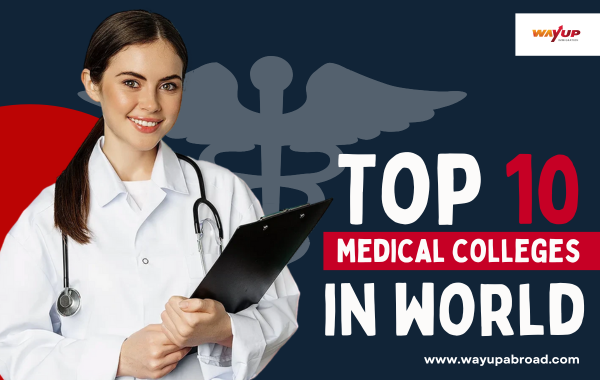Table of Content
Top 10 Medical Colleges in World - Overview
The field of medicine is always fascinating and a good career option for students! Pursuing a degree in the medical field is a great choice but you should choose from the Top 10 Medical Colleges In World for best education.
Pursuing a degree in medicine involves everything that completes a professional cycle, from learning human anatomy, diagnosing and treating disorders, and using information for the benefit of society.
So, why would anyone pass up the opportunity to study medicine and become a great doctor with a degree from a globally renowned institute?
Choosing the proper medical college is the first step toward a fulfilling medical career. Among the various alternatives, these are the top ten best medical colleges in the globe to begin with best medical universities in the world .
Top 10 Medical Colleges in the World 2024
The top ten medical schools in the world for 2024, according to QS Rankings, are:
1. Harvard University
Harvard University of of the best medical universities in the world, established in 1636, is the oldest institution of higher learning in the United States. Located in Cambridge, Massachusetts, it is renowned globally for its academic excellence, influential research, and prestigious alumni network. Harvard comprises ten faculties, including the Harvard Business School, Harvard Law School, and Harvard Medical School, offering a diverse range of undergraduate, graduate, and professional programs. With an extensive library system, cutting-edge research facilities, and a vibrant campus life, Harvard fosters intellectual growth and innovation. Its faculty includes numerous Nobel laureates, Pulitzer Prize winners, and other distinguished scholars. The university's commitment to leadership, intellectual exploration, and societal impact has positioned it as a beacon of education, attracting students from around the world. Harvard's alumni network includes prominent figures in various fields, contributing significantly to global advancements and maintaining the university's legacy of excellence.
Acceptance Rate: Approximately 4.6% for undergraduate admissions.
Course Duration: Undergraduate programs typically span four years. Graduate and professional programs vary in duration.
Average Tuition Fee: For the 2023-2024 academic year, tuition and fees are approximately $59,950.
2. University of Oxford
The University of Oxford is also considered one of the top medical colleges in the world, founded in 1096, is the oldest university in the English-speaking world, and one of the most prestigious globally. Located in Oxford, England, it comprises 39 autonomous colleges and six permanent private halls, offering a unique collegiate system. Oxford is renowned for its rigorous academic programs, cutting-edge research, and influential alumni, including numerous Nobel laureates, British prime ministers, and international leaders. The university offers a wide range of undergraduate and graduate programs across various disciplines, from humanities and social sciences to science and technology. Oxford's Bodleian Libraries are among the oldest and most comprehensive in the world, providing extensive resources for study and research. The university's commitment to intellectual excellence, innovation, and global impact continues to attract students and scholars from around the world, making it a leading institution in shaping future generations of leaders and thinkers.
Acceptance Rate: Varies by program and college but generally low, especially for undergraduate programs.
Course Duration: Undergraduate programs usually last three to four years. Graduate programs vary.
Average Tuition Fee: Tuition fees for international students range from £25,740 to £37,510 per year, depending on the program.
3. Stanford University
When We are taking about the best medical colleges in the world how do we forget Stanford University? It was established in 1885 by Leland and Jane Stanford, is a prestigious private research university located in Stanford, California. Known for its entrepreneurial spirit, Stanford has played a pivotal role in the development of Silicon Valley and continues to foster innovation and leadership in various fields. The university offers a diverse array of undergraduate, graduate, and professional programs through its seven schools, including the School of Engineering, the School of Humanities and Sciences, and the Graduate School of Business.
Stanford's faculty includes numerous Nobel laureates, Turing Award winners, and other distinguished scholars who contribute to its strong emphasis on research and academic excellence. The campus is home to cutting-edge facilities, including the SLAC National Accelerator Laboratory and the Hoover Institution. Stanford's vibrant student life, extensive athletic programs, and commitment to sustainability further enhance its reputation as a world-class institution. The university's alumni network includes influential figures in technology, politics, business, and the arts, reflecting its significant impact on global progress and innovation.
Acceptance Rate: Approximately 4.3% for undergraduate admissions.
Course Duration: Undergraduate programs are typically four years. Graduate programs vary in length.
Average Tuition Fee: Tuition and fees for the 2023-2024 academic year are approximately $59,976.
4. Johns Hopkins University
Johns Hopkins University is known as one of the best medical colleges in world more than the above 3 but this college is ranked at 4th in the list of top 10 medical colleges in world. Johns Hopkins University was founded in 1876, and is a private research university based in Baltimore, Maryland. Named after its benefactor, Johns Hopkins, it was the first university in the United States to adopt the concept of integrating teaching and research. Renowned for its emphasis on scientific inquiry and discovery, Johns Hopkins is a global leader in various fields, particularly in medicine, public health, and engineering.
The university is home to nine academic divisions, including the prestigious Johns Hopkins School of Medicine, the Bloomberg School of Public Health, and the Whiting School of Engineering. It operates multiple campuses and facilities, including the renowned Johns Hopkins Hospital, consistently ranked among the top hospitals in the world.
Johns Hopkins is distinguished by its rigorous academic programs, cutting-edge research initiatives, and a commitment to improving human health and societal well-being. Its faculty and alumni include numerous Nobel laureates, Pulitzer Prize winners, and leaders in various industries. The university's dedication to innovation and excellence continues to attract students and scholars from around the globe, making it a pivotal institution in advancing knowledge and addressing global challenges.
Acceptance Rate: Around 7.7% for undergraduate admissions.
Course Duration: Undergraduate programs are typically four years. Graduate and professional programs vary.
Average Tuition Fee: Tuition and fees for the 2023-2024 academic year are approximately $59,550.
5. University of Cambridge
The University of Cambridge is well known among Indian students and ranked 5th in the list of best medical universities in the world in 2024. This university was established in 1209, and is one of the world's oldest and most prestigious universities. Located in Cambridge, England, it comprises 31 autonomous colleges and over 150 departments, faculties, and institutes. Cambridge is renowned for its academic excellence, rigorous scholarship, and influential research, making significant contributions to various fields of study.
The university offers a wide range of undergraduate and postgraduate programs across disciplines such as humanities, social sciences, natural sciences, and engineering. Cambridge has produced a remarkable number of distinguished alumni, including over 100 Nobel laureates, prominent scientists, writers, and political leaders.
Cambridge's rich history is reflected in its iconic architecture, historic libraries, and world-class museums. The university fosters a stimulating intellectual environment, encouraging critical thinking and innovation. Its faculty comprises leading experts who drive groundbreaking research and teaching. The vibrant student life, extensive extracurricular opportunities, and picturesque setting along the River Cam further enhance the Cambridge experience. The University of Cambridge continues to shape global education and research, maintaining its legacy as a leading institution for intellectual and scientific advancement.
Acceptance Rate: Varies by program and college but generally low, particularly for undergraduate programs.
Course Duration: Undergraduate programs typically last three to four years. Graduate programs vary.
Average Tuition Fee: Tuition fees for international students range from £22,227 to £62,958 per year, depending on the program.
6. UCL (University College London)
University College London (UCL) is one of the best medical colleges in London ranked 1st in the city and 6th in the world for their medical degrees. UCL founded in 1826, is a leading public research university located in the heart of London, England. As the first university in England to admit students regardless of their religion and the first to admit women on equal terms with men, UCL has a long-standing tradition of inclusivity and academic excellence.
UCL offers a wide range of undergraduate, postgraduate, and professional programs across various disciplines, including arts and humanities, engineering, life sciences, and social sciences. It is renowned for its pioneering research, innovation, and commitment to addressing global challenges. The university's research strengths include areas such as neuroscience, global health, sustainable cities, and data science.
The university boasts an impressive faculty that includes Nobel laureates, fellows of the Royal Society, and other distinguished scholars. UCL's diverse student body, vibrant campus life, and strong emphasis on interdisciplinary collaboration create a dynamic and stimulating academic environment.
UCL's location in London provides students with access to a wealth of cultural, professional, and academic resources, further enhancing their educational experience. The university's global outlook, dedication to social impact, and commitment to excellence continue to position it as a leading institution in higher education.
Acceptance Rate: Approximately 7.7% for undergraduate admissions.
Course Duration: Undergraduate programs typically last three to four years. Graduate programs vary.
Average Tuition Fee: Tuition fees for international students range from £19,620 to £33,560 per year, depending on the program.
7. Karolinska Institutet Stockholm
Karolinska Institutet is less famous among Indian students but it ranked 7th in the list of top 10 medical colleges in world, located in Stockholm, Sweden. As you know it is one of the world's foremost medical universities and a leading center for biomedical research. Established in 1810, it is known for its pioneering contributions to medical and health sciences education and research. The institute offers a comprehensive range of undergraduate, graduate, and doctoral programs in medicine, biomedicine, and health sciences. Karolinska Institutet is particularly renowned for its Nobel Assembly, which selects the Nobel laureate in Physiology or Medicine annually.
Research at Karolinska spans a wide array of disciplines, including neuroscience, molecular biology, epidemiology, and public health. The institute's faculty and researchers are at the forefront of advancing medical knowledge and innovation, contributing significantly to global health outcomes.
Karolinska Institutet's commitment to excellence in education, research, and clinical practice has earned it international recognition and made it a magnet for students and scholars from around the world seeking to make significant contributions to medicine and healthcare.
Acceptance Rate: Specific acceptance rate data not readily available; highly competitive for medical and health sciences programs.
Course Duration: Medical programs typically last around five and a half years (including internships). Graduate programs vary.
Average Tuition Fee: Tuition fees for international students are approximately SEK 310,000 per year for medical programs.
8. Imperial College, London
Imperial College London is famous for so many degree courses but in the filed of medicine, it ranked 8th in the world. Imperial Colleg was established in 1907, is a world-class university mainly known for its focus on science, engineering, medicine, and business. Located in London, England, it consistently ranks among the top universities globally for its research output and academic excellence. Imperial offers a range of undergraduate, postgraduate, and professional programs across its faculties, fostering innovation and interdisciplinary collaboration. The university's strong ties to industry and commitment to tackling global challenges through research and education have earned it a reputation as a leader in science and technology, attracting talented students and researchers from around the world.
Acceptance Rate: Approximately 14% for undergraduate admissions.
Course Duration: Undergraduate programs typically last three to four years. Graduate programs vary.
Average Tuition Fee: Tuition fees for international students range from £31,750 to £37,500 per year, depending on the program.
9. University of California, San Francisco
The University of California, San Francisco famously known as UCSF is of the best medical colleges in world. UCSF founded in 1864, is a renowned public research university dedicated entirely to health sciences. Located in San Francisco, California, UCSF is known for its excellence in medical education, biomedical research, and patient care. It comprises several schools and graduate programs focusing on medicine, dentistry, pharmacy, nursing, and biomedical sciences.
UCSF is affiliated with top-ranked hospitals and research institutes, including UCSF Medical Center and UCSF Benioff Children's Hospitals, contributing to its leadership in advancing healthcare through innovation and cutting-edge research. The university's faculty includes numerous Nobel laureates, MacArthur Fellows, and members of prestigious scientific academies, reflecting its commitment to pushing the boundaries of medical knowledge and improving global health outcomes.
Acceptance Rate: Varies by program but generally highly competitive, especially for medical and health sciences programs.
Course Duration: Medical programs typically range from four to six years, depending on the specialization. Graduate programs vary.
Average Tuition Fee: Tuition fees for medical programs are approximately $50,030 per year for non-residents.
10. Yale University
I don’t know why this college ranked 10th on the list of top colleges for medicine. But as I am an immigration consultant I know so many Indian students apply for Yale University as their priority. Yale University, founded in 1701 in New Haven, Connecticut, is one of the oldest and most prestigious universities in the United States. Known for its liberal arts education, Yale offers a wide range of undergraduate, graduate, and professional programs through its twelve constituent schools, including Yale College, the Graduate School of Arts and Sciences, and Yale Law School.
Yale's rigorous academic environment fosters intellectual inquiry and critical thinking across disciplines such as humanities, sciences, social sciences, and the arts. The university's faculty includes leading scholars, researchers, and practitioners who are dedicated to pushing the boundaries of knowledge and scholarship. Yale's campus features historic architecture, world-class libraries, and numerous cultural and extracurricular opportunities, enriching the student experience and fostering a vibrant community of learning and discovery.
Acceptance Rate: Approximately 6.5% for undergraduate admissions.
Course Duration: Undergraduate programs typically span four years. Graduate and professional programs vary.
Average Tuition Fee: Tuition and fees for the 2023-2024 academic year are approximately $61,620.
Top 20 Medical Colleges in the World 2024 According to QS Ranking
Here is the list of Top 20 medical colleges in the world with QS ranking 2024:
| QS Ranking 2024 | University | Location |
| 1 | Harvard University | United States |
| 2 | University of the Oxford | United Kingdom |
| 3 | Stanford University | United States |
| 4 | Johns Hopkins University | United States |
| 5 | University of Cambridge | United Kingdom |
| 6 | UCL | United Kingdom |
| 7 | Karolinska Institutet | Sweden |
| 8 | Imperial College, London | United Kingdom |
| 9 | University of California, San Francisco | United States |
| 10 | Yale University | United States |
| 11 | Massachusetts Institute of Technology (MIT) | United States |
| 12 | University of California, Los Angeles (UCLA) | United States |
| 13 | King's College London | United Kingdom |
| 14 | University of Toronto | Canada |
| 15 | University of Pennsylvania | United States |
| 16 | Duke University | United States |
| 17 | McGill University | Canada |
| 18 | National University of Singapore (NUS) | Singapore |
| 19 | The University of Melbourne | Australia |
What Are the Admission Requirements For the Top Medical Colleges in the World?
Admission requirements for top medical colleges around the world generally include a combination of academic qualifications, standardized test scores, practical experience, personal statements, and letters of recommendation. Here's a general overview of typical requirements:
Academic Qualifications:
Completion of a bachelor's degree (for graduate medical programs) or secondary school qualifications (for undergraduate medical programs).
Specific prerequisite courses in sciences such as biology, chemistry, physics, and mathematics.
Standardized Tests:
For undergraduate programs: SAT or ACT scores (in the US) or equivalent standardized tests (varies by country).
For graduate programs: MCAT (Medical College Admission Test) in the US, UKCAT or BMAT (UK), GAMSAT (Australia), or country-specific tests.
Practical Experience:
Relevant clinical or research experience, such as internships, volunteer work in healthcare settings, or laboratory research.
Personal Statement or Essay:
A statement of purpose or essay outlining your motivation for studying medicine, career goals, and relevant experiences.
Letters of Recommendation:
Typically, letters from professors, employers, or healthcare professionals who can attest to your academic abilities, character, and suitability for medical studies.
Interviews:
Some programs may require interviews to assess interpersonal skills, ethical reasoning, and suitability for the medical profession.
Language Proficiency:
Proof of proficiency in the language of instruction (e.g., TOEFL or IELTS scores for non-native English speakers).
Additional Requirements:
Some programs may have additional requirements such as specific certifications (e.g., CPR certification), background checks, or health screenings.
Medical Degrees In Different Countries
Medical degrees vary significantly across different countries, reflecting diverse educational systems and healthcare practices. In the United States, Canada, and Australia, medical education typically begins with an undergraduate degree followed by a medical school program leading to a Doctor of Medicine (MD) or equivalent degree. These programs emphasize both theoretical knowledge and clinical training, often requiring rigorous standardized tests such as the MCAT in the US or the GAMSAT in Australia for admission.
In contrast, countries like the United Kingdom and many European nations offer integrated medical programs directly after secondary education. These programs, such as the MBBS (Bachelor of Medicine, Bachelor of Surgery) in the UK, combine basic medical sciences with clinical training from the outset, leading to qualification as a doctor within 5-6 years. Admission often involves aptitude tests like the UKCAT or BMAT alongside academic qualifications.
In countries like India and Pakistan, medical education follows a similar integrated model after completing secondary education, leading to degrees like MBBS. These programs often include a mandatory internship year before full licensure. Medical education in these regions places a strong emphasis on practical clinical skills and community health.
As a result, the structure and requirements vary, medical degrees worldwide share a commitment to preparing graduates with the knowledge, skills, and ethical foundation necessary for medical practice, each tailored to the specific needs and healthcare systems of their respective countries.
FAQ
Q: What sets Johns Hopkins apart in medical education?
A: Johns Hopkins is renowned for pioneering research, top-ranked hospitals, and a strong emphasis on interdisciplinary collaboration.
Q: How does Stanford University Medical School support innovation?
A: Stanford fosters innovation through its Silicon Valley location, cutting-edge research centers, and collaborative medical education approach.
Q: What makes Harvard Medical School unique?
A: Harvard Medical School offers unparalleled research opportunities, world-class faculty, and a rich history of medical breakthroughs.
Q: What are Yale School of Medicine's strengths?
A: Yale excels in patient-centered care, innovative medical research, and interdisciplinary education in a vibrant academic community.
Q: How does University of California, San Francisco (UCSF) stand out?
A: UCSF is known for its focus on health equity, cutting-edge biomedical research, and its top-ranked medical centers.
Q: What distinguishes Karolinska Institutet in Stockholm?
A: Karolinska Institutet is renowned for selecting the Nobel Prize in Physiology or Medicine and its leading role in global health research.
Q: Why choose University College London (UCL) for medical studies?
A: UCL offers world-class medical education, access to top hospitals, and a vibrant multicultural environment in the heart of London.
Q: How does Imperial College London support medical innovation?
A: Imperial College London integrates medical research with engineering and technology, fostering groundbreaking advancements in healthcare.
Q: What are the strengths of the University of Cambridge Medical School?
A: Cambridge excels in biomedical research, clinical training, and global health initiatives, supported by its historic and innovative approach.
Q: What makes Oxford Medical School a top choice?
A: Oxford offers rigorous medical education, access to renowned research facilities, and a focus on academic excellence and clinical training.







Leave a Reply